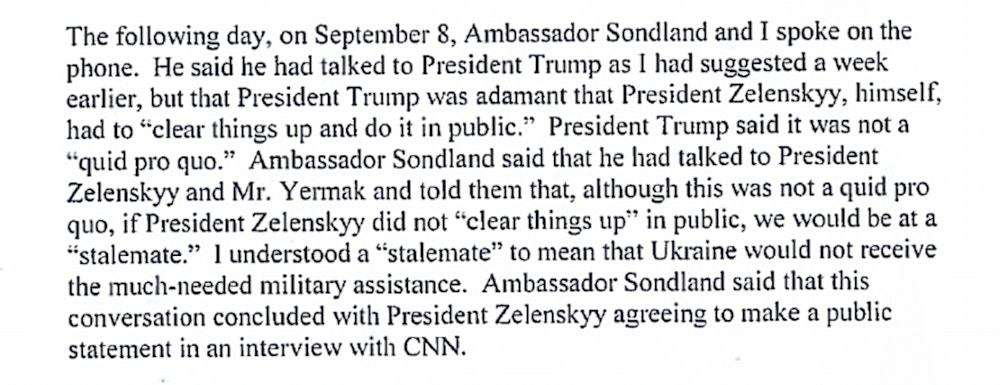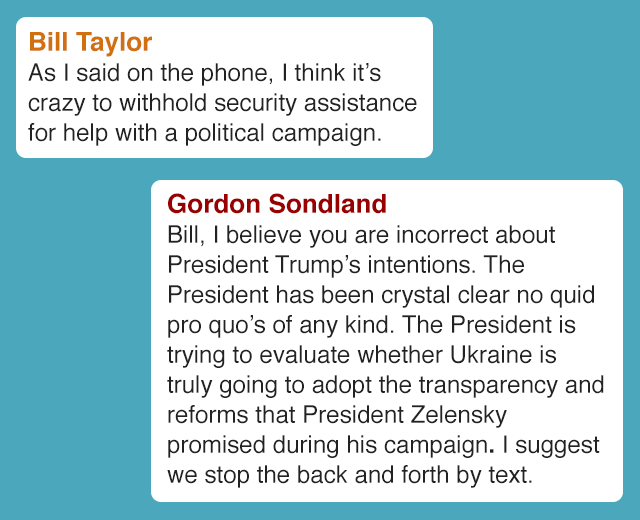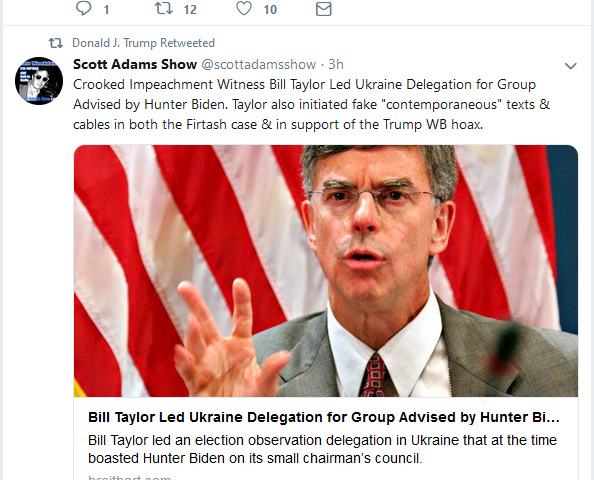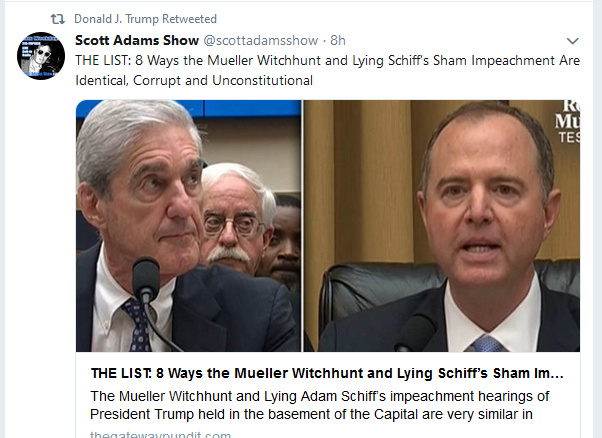Trump Pressed Ukraine’s President to Act Out a Fake News Script, Live on CNN
Before agreeing to release nearly $400 million in military assistance to Ukraine, President Donald Trump extorted a promise from his Ukrainian counterpart, Volodymyr Zelensky, to appear on American television and act out a script prepared for him by Trump’s aides, the top American diplomat in Ukraine, Bill Taylor, told the House impeachment inquiry on Tuesday.
The scene a desperate Zelensky finally agreed to perform would have been the very definition of fake news: a dramatic announcement by the Ukrainian president, during a CNN interview, that he was opening criminal investigations on Joe Biden’s family and other Democrats.
The plot, which would have duped American voters into believing that there was some substance to a debunked conspiracy theory about Biden’s work in Ukraine as vice president, came very close to working.
According to Taylor, a career foreign service official who has served four Republican and two Democratic presidents, until early September, Zelensky and his aides had resisted pressure from Trump to help him smear Biden. Zelensky was supposed to do this by investigating Burisma, a Ukrainian gas company the former vice president’s son Hunter was once paid to advise, as well as claims that Ukrainian officials had revealed evidence of financial crimes by Trump’s campaign manager Paul Manafort in 2016 to help elect Hillary Clinton.
But once the Ukrainians became aware that the much-needed security assistance Trump had personally held up might never be delivered, Zelensky agreed to play his part in a ruse intended to lend credibility to baseless conspiracy theories about Biden and other Democrats.
By the first week of September, Taylor said, the “favor” Trump had alluded to in vague terms in a July phone call with Zelensky had become a very specific demand: Ukraine’s president, a former actor, would be required to deliver lines on CNN prepared for him by two American diplomats acting on orders from Trump and his shadow secretary of state, Rudy Giuliani.
Text messages released earlier this month between those two diplomats — Kurt Volker, the former U.S. special envoy to Ukraine, and Gordon Sondland, the U.S. ambassador to the European Union — show that they drafted language for Zelensky’s statement in August to send to the Ukrainian president’s close friend and personal aide, Andrey Yermak.
“Special attention should be paid to the problem of interference in the political processes of the United States, especially with the alleged involvement of some Ukrainian politicians,” Zelensky would tell CNN. “I want to declare that this is unacceptable. We intend to initiate and complete a transparent and unbiased investigation of all available facts and episodes including those involving Burisma and the 2016 U.S. elections.”
The White House plot to unwittingly involve CNN in the dissemination of false information created by Trump’s aides was revealed in Taylor’s written opening statement to the House impeachment inquiry, which was obtained by several news organizations on Tuesday.
A screenshot of Ambassador Bill Taylor’s statement to the House impeachment inquiry.
It was not immediately clear if an interview with CNN had been scheduled by the Ukrainian president’s office, but the choice of the network was rich with irony, given that Trump has regularly described accurate reporting on his presidency by its correspondents as “fake news.” It also seems instructive that the president was aware that it would be less politically useful to him to have Zelensky appear on a Fox News show and pretend that he was opening investigations of Biden and other Democrats based on the merits.
As Asha Rangappa, a lawyer and former FBI special agent, pointed out, the White House plot to manipulate the Ukrainian president into making statements to CNN that were secretly dictated by Trump’s aides might also have been illegal. “The 1991 Intelligence Authorization Act,” Rangappa wrote earlier this month, “prohibits the U.S. government from using covert actions — which include propaganda — to ‘influence United States political processes, public opinion, policies, or media.’”
“Black propaganda attempts to conceal the true source of information so that the target (in this case, the American public) cannot accurately assess the credibility of the message or the motives of the source behind it,” Rangappa explained. “By having the information emanate from a separate and more credible outlet, the target audience is more likely to believe it.”
“It’s called legitimizing propaganda,” she observed on Twitter, after Taylor revealed the plot to place Zelensky on CNN. “You place the information you want people to believe in what appears to be an independent source unconnected to you. Then you can cite it as further ‘evidence’ of your own claims, making them appear more credible.”
Taylor testified on Tuesday that, despite his firm opposition, the White House-directed plot to manufacture news footage that could be used in Trump campaign ads attacking Biden very nearly succeeded.
Taylor, who has been the temporary chief of mission in Kyiv, the Ukrainian capital, since the previous U.S. ambassador, Marie Yovanovitch, was forced out for supposed disloyalty to Trump, told the impeachment inquiry that he and two United States senators who met Zelensky on September 5 — Ron Johnson, R-Wis., and Chris Murphy, D-Conn. — had urged him not to take sides in American politics. Zelensky’s “first question to the senators was about the withheld security assistance,” Taylor wrote. “My recollection of the meeting is that both senators stressed that bipartisan support for Ukraine in Washington was Ukraine’s most important strategic asset and that President Zelenskyy should not jeopardize that bipartisan support by getting drawn into U.S. domestic politics,” he added.
“I had been making (and continue to make) this point to all of my Ukrainian official contacts,” Taylor continued. “But the push to make President Zelenskyy publicly commit to investigations of Burisma and alleged interference in the 2016 election showed how the official foreign policy of the United States was undercut by the irregular efforts led by Mr. Giuliani.”
Three days later, Taylor testified, he was told by Sondland, a Trump donor who was reportedly angling for a cabinet position, that the Ukrainian president had agreed to make the required statement during an interview with CNN.
The next day, September 9, Michael Atkinson, the inspector general for the U.S. intelligence community, notified the House intelligence committee of a whistleblower complaint and three House committees launched an investigation of the White House campaign to press Ukraine to smear Biden. The investigation of the whistleblower’s complaint appears to have derailed the White House campaign to force Zelensky to make the statement to CNN at the last moment.
When the U.S. aid to Ukraine was finally released two days later, Taylor testified that he “again reminded Mr. Yermak of the high strategic value of bipartisan support for Ukraine and the importance of not getting involved in other countries’ elections.”
“My fear at the time,” Taylor said, “was that since Ambassador Sondland had told me President Zelenskyy already agreed to do a CNN interview, President Zelenskyy would make a statement regarding ‘investigations’ that would have played into domestic U.S. politics.” Taylor reported that he spent two days pressing an aide to Zelensky “to confirm that there would be no CNN interview, which he did.”






 I don’t think the Speaker would hold this vote if it wasn’t absolutely necessary to move forward.
I don’t think the Speaker would hold this vote if it wasn’t absolutely necessary to move forward.